Hydration and sleep are both key foundations for health and wellness. Without adequate rest, recovery and hydration, all aspects of your physical performance and health will suffer. It is easy to neglect these areas of health, but if you want to perform at your fastest and fittest you need to make sure your hydration and sleep are on point EVERY DAY!
Hydrating for Performance
Your body is made up of a lot of water, and it plays a vital role in a lot of bodily functions. When we exercise, we lose water, predominantly through sweating. Everybody’s sweat rate is different, and the intensity, environment and type of exercise can have an impact.
The best way to stay on top of your hydration for performance is to break it down into three categories:
– Pre hydration
– Fluid intake during exercise
– Rehydration post exercise
Focusing on all three of these will reduce the likelihood of dehydration and the negative impact that can have on mental and physical performance.
Checking if you are hydrated
One of the simplest ways to see if you are hydrated is to check your urine! The colour of your urine can be a good indicator of how hydrated you are. If you are well hydrated your urine will be pale-clear, if you are dehydrated it will be darker-highly concentrated yellow colour.
Sadly, you are usually already slightly dehydrated if you feel thirsty. So, the best thing to do is to always keep a drink or a bottle of water with you and consistently sip from this throughout the day. As an athlete you want to aim for around 200-500ml every hour of the day.
Pre-Hydration
Guidelines generally recommend drinking small amounts of water 4-6 hours before training or a hockey match. You want to aim for at least 500ml of water 2-4 hours before exercise, and an additional 400-600ml of fluids 30-60 minutes before exercise.
This beverage could be a sports drink that contains electrolytes such as sodium to increase fluid retention.
Hydration During Exercise
The aim of hydration during exercise is to prevent any substantial fluid loss. A loss of over 2% of your body weight can have negative effects on health and performance. As mentioned before, sweat rates are different for everyone and many things can affect the rate an individual sweating.
It is recommended to drink during exercise slowly and continually. Most athletes find it optimal to consume 340-450ml every 15 minutes of exercise. If exercise is over 90 minutes these fluids can contain 6-8% carbohydrate solutions with 300-600mg of sodium.
If you are in an intense training session/match or it is a very hot day, then make sure to consume more fluids and aim for around 2L of fluid every hour.
Rehydration Post-Exercise
The aim here is to replace the fluids and electrolytes lost during exercise. If you are able to do pre-exercise and post exercise weigh in’s you can calculate how much fluid you need specifically. It is recommended to consume 3 cups of water for every pound lost during exercise.
This rehydration should be done steadily over a few hours and before your next bout of exercise. Aim to drink around 500ml every hour post-exercise. This is a good time to incorporate smoothies, chocolate milk or coconut water as these will replenish lost fluids, electrolytes and glucose and aid in muscle recovery.
How Hydration Affects Sleep
As you now know, hydration is very important for optimal performance in hockey. But did you know that one of the best ways to get a good night’s sleep is also to be well hydrated?
Recent evidence has found that there is an association between shorter sleep durations and a lower hydration status. This means that the people who slept for 6 hours were found to be less hydrated than others who slept for 8 hours or longer!
When you are dehydrated you may feel very tired, fatigued, have headaches, dry mouth and muscle cramps. All of these symptoms, even if they are minor, can disrupt your sleep and make it so much harder to sleep well.

However, excess hydration can also cause sleep problems as frequent trips to the bathroom which can cause broken sleep. This is more likely to happen if you drink a lot of water late at night or close to bedtime.
So, if you want to get a good night’s sleep, the best thing to do is keep hydrated during the day and slightly lower your fluid intake closer to bedtime. Try limiting your fluid intake and only take small sips of drinks one hour before bed time.
Nutrition that Affects Sleep Positively
Sleep is a key part of wellbeing and has numerous positive and important functions for athletes. Sleep deprivation can affect glucose metabolism, neuroendocrine function, appetite, energy intake and protein synthesis. All of these factors will negatively impact your athletic performance and recovery.
There are a number of nutritional interventions that athletes can incorporate to increase sleep quality and sleep quantity.
It has been found that having your evening meal high in complex carbohydrates and leafy green vegetables can improve your sleep by increasing your magnesium intake and increasing the secretion of serotonin.
Furthermore, changing up your pre bedtime snack can have a great impact on our sleep! Try opt for foods with some protein, magnesium and antioxidants! Here are some snacky foods that help with sleep;
– Kiwi fruits
– Tart cherry juice
– Brazil nuts
– Cashew nuts
– Almonds
– Chia seeds
– Pumpkin seeds
– Cottage cheese
Try out different combinations of these foods, for example, oats with milk and pumpkin seeds, kiwi’s with Greek yogurt, rice crackers topped with cottage cheese, chia seeds and cherries!
Nutrition that Affects Sleep Negatively
There are also foods that can have a negative effect on your sleep too! Try to avoid or limit these foods after your dinner (or at least 2 hours before bed) to help increase your sleep quality and quantity.
– Caffeine. Try to not have any caffeine after 2pm.
– Black tea. This has caffeine in too!
– Processed foods high in sugar such as sweets, chocolates, donuts, cakes and biscuits.
– Foods with a high glycaemic index, such as white bread as this can raise your blood sugar and make it harder to fall asleep.
– Spicy foods, as this can cause heart burn.
– Foods high in fat as these are harder to digest. Such as nuts, sausages, avocadoes, and fried foods.
For some people eating too late at night can also cause sleep disruptions. If you experience heart burn, acid reflux or tummy aches then try stop eating two hours before bed. This gives your body time to digest the food and allows your blood sugar and insulin levels to regulate.
Summary
As an athlete it is important to prioritise your sleep and hydration. To become the best athlete, you need to put the work and effort in outside of training as well. Getting a good nights sleep every night and managing your nutrition everyday will take your training and performance to the next level!





I can’t thank you enough for this amazing post. It has given me a whole new perspective. If you’re interested in more insights, click here.